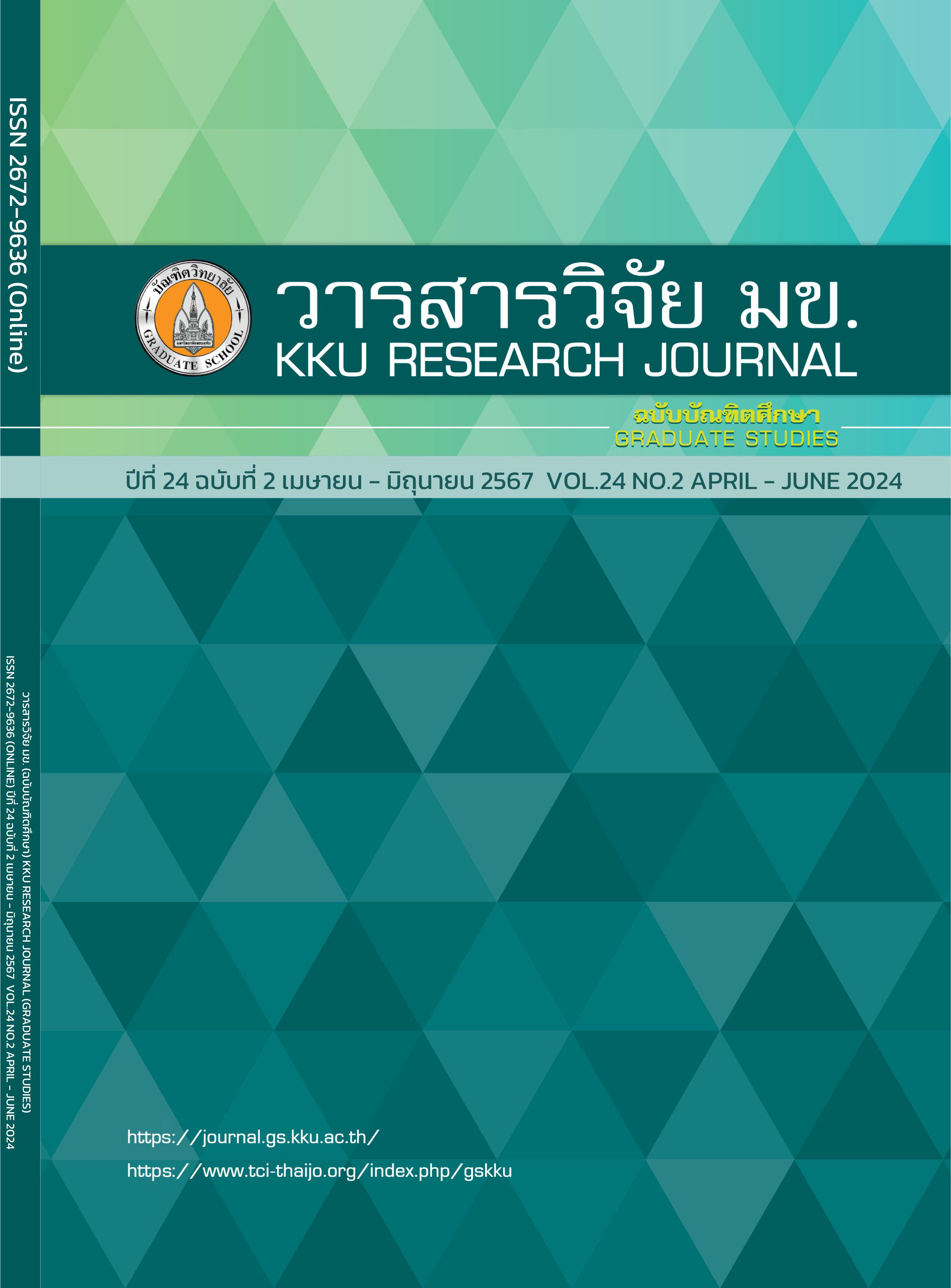Effectiveness of Anti-Viral Medications for Treatment of Chronic Hepatitis C: A Retrospective Study in a Tertiary Care Hospital in Northeast Thailand
Keywords:
Hepatitis C virus infection, anti-viral medications, Sustained Virologic ResponseAbstract
The objectives of the study were to assess the effectiveness of the anti-viral medications for treatment of chronic hepatitis C virus (HCV) infection and the factors associated with the effectiveness. The method was a retrospective study conducted in outpatients treated with anti-HCV medications at Khon Kaen hospital during January 1st 2019 to December 31st 2020. Demographic, social history, and medical history data were collected from medical records. Effectiveness was determined as an undetectable HCV RNA in the blood (<25 IU/mL) at 12 weeks post-treatment (Sustained Virologic Response; SVR12) and analyzed using descriptive analysis. Multivariate logistic regression analysis was used to identify factors associated with the effectiveness. The results showed that from a total of 160 patients included to the study, HCV genotypes 1, 3, 6 were found in 38.8, 43.1, and 18.1%, respectively. Majority of the patients were male (76.2%) and the average age was 50.5years. There were 75 patients (46.9%) having cirrhosis, 16 (10.0%) having HIV infection, and 22 (13.8%) having a previous treatment failure. Overall, SVR12 was achieved in 153 patients (95.6%). The SVR12 rate of genotype 3 was 98.6%. Patients with HCV genotype 1 achieved SVR12 at 95.7% in non-cirrhosis group and 94.9% in cirrhosis group. Similarly, SVR12 of genotype 6 patients was achieved in 100% and 84.2% in non-cirrhosis and cirrhosis group, respectively. Three significant factors, including female gender (adjusted odds ratio (OR) 0.11; 95% CI 0.02-0.85), co-infection with HIV (OR 0.06; 95% CI 0.01-0.53) and genotype 6 with cirrhosis (OR 0.04; 95% CI 0.01-0.45), were negatively associated with treatment effectiveness. In conclusions, anti-HCV treatment was effective for genotype 1, 3, and 6 infections. The patients with no cirrhosis were likely to have better respond to the anti-HCV treatment. Female gender, co-infection with HIV, and genotype 6 with cirrhosis were significant factors negatively affecting effectiveness of HCV treatment.
References
Khotakhot P, Praditsittikorn N, Thongbai A, Nakarat B, Yongyuen D, Wannapan K, et al. Prevention research plan disease control and health threats 2019-2021. DIR. February 2019.
Margaret Chan (WHO Director-General). World Health Organization. Global hepatitis report, 2017. Retrieved October 23, 2020, from https://www.who.int/hepatitis/publications /global-hepatitis-report2017/en/.
Hepatitis C Information Center - American Liver Foundation.(2023). Retrieved March 3, 2023.
https://liverfoundation.org/liver-diseases/viral-hepatitis/hepatitis-c/.
Sunanchaikarn S, Theamboonlers A, Chongsrisawat V, Yoocharoen P, Tharmaphompilas P, Warinsathien P, et al. Seroepidemiology and genotypes of hepatitis c virus in Thailand. Asian Pac J Allergy Immunol 2007;25(2-3): 175-182.
Jatapai A, Nelson KE, Chuenchitra T, Kana K, Eiumtrakul , Sunantarod E, et al. Prevalence and risk factors for hepatitis c virus infection among young Thai men. Am J Trop Med Hyg 2010;83:433-439.
The Liver Association of Thailand. Thailand Practice Guideline for Management of Chronic B and C 2015. 1st edition. Nonthaburi: Printmaking Limited Partnership; 2015.
Kanwal F, Kramer JR, El-Serag HB, Frayne S, Clark J, Cao Y, et al. Race and gender differences in the Use of airect acting antiviral agents for hepatitis C virus. IDSA. 2016;63(3):291–299.
Wong RJ, Jain MK, Therapondos G, Shiffman ML, Kshirsagar O, Clark C, et al. Race/ethnicity and insurance status disparities in access to direct acting antivirals for hepatitis C virus treatment. AJG. 2018;113(9):1329–1338.
Gane EJ, Stedman CA, Hyland RH, Ding X, Svarovskaia E, Symonds WT, et al. Nucleotide polymerase inhibitor sofosbuvir plus ribavirin for hepatitis C. NEJM. 2013 ;368(1):34–44.
Janyakhantikul S. Chronic Hepatitis C Infection: Basic Knowledges, Drugs and Therapeutic Guidelines. IJPS 2015; 11(4): 1-21.
Announcement of the National Drug System Development Board. (2018). Subject: National List of Essential Medicines, 2018. Guidelines for drug use in treating chronic hepatitis C patients. in patients with or without HIV infection with 1 genotype 1, 2, 4, 6 with Sofosbuvir/Ledipasvir (SOF/LDV) and 2.genotype 3 with Sofosbuvir (SOF) with Peg interferon alfa. (Type 2a or 2b) and Ribavirin. Announced on January 4, 2018.
Pourhoseingholi MA, Vahedi M, Rahimzadeh M. Sample size calculation in medical studies. Gastroenterol Hepatol Bed Bench 2013; 6(1): 14-17.
Kowdley Kv, Gordon SC, Reddy KR, Rossaro L, Bernstein DE, Lawitz E, et al. Ledipasvir and sofosbuvir for 8 or 12 weeks for chronic HCV without cirrhosis. NEJM. 2014;370(20):1879–1888.
Lawitz E, Mangia A, Wyles D, Rodriguez-Torres M, Hassanein, GordonSC, et al. Sofosbuvir for previously untreated chronic hepatitis C infection. NEJM. 2013; 368(20):1878–1887.
Wei B, Ji F, Yeo YH, Ogawa E, Zou B, Stave CD, et al. Real-world effectiveness of sofosbuvir plus ribavirin for chronic hepatitis C genotype 2 in Asia: A systematic review and meta-analysis. BMJ Open Gastroenterology. 2018; 5(1).
Charlton M, Everson GT, Flamm SL, Kumar P, Landis C, Brown RS, et al. Ledipasvir and Sofosbuvir Plus Ribavirin for Treatment of HCV Infection in Patients with Advanced Liver Disease. Gastroenterology. 2015;149(3):649–659.
Milazzo L, Lai A, Calvi E, Ronzi P, Micheli V, Binda F, et al. Direct-acting antivirals in hepatitis c virus (HCV)-infected and HCV/HIV-coinfected patients: real-life safety and efficacy. HIV Med 2017; 18(4):284-291.
Downloads
Published
Issue
Section
License
Copyright (c) 2024 KKU Research Journal (Graduate Studies)

This work is licensed under a Creative Commons Attribution-NonCommercial-NoDerivatives 4.0 International License.



